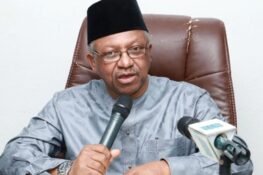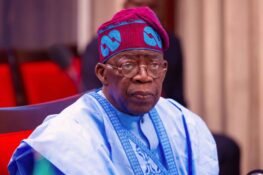Wrapped in a large Nigerian flag, the sensational Tobi Amusan shifted focus momentarily from Nigeria’s monumental problems to its great potential.
The story captured what Nigeria could achieve if its citizens had the right opportunities.
Amusan held the whole word captive at the 2022 World Athletics Championships after she shattered the 100m hurdles world record twice in a matter of hours.
Her gold medal triggered a social media frenzy, as the euphoria of victory in sports enveloped Nigeria.
For a moment, Nigeria was a nation again. The heightened alert about insecurity, instability and economic challenges paled.
The manner in which Amusan won her race was remarkable.
She ran an unbelievable 12.12 seconds in the semi-final to smash smashing her personal best and the world record.
She was so fast that the former world 200m and 400m record holder, Michael Johnson, wondered whether the timing system was faulty.
Some even asked if it was her track spikes that gave her the smashing speed.
We know why Amusan sits on top of the world.
She is an excellent athlete who had been on a progressive ascendancy since 2018. “My abilities are not centered around spikes,” said replied critics.
As a teenager, she was already a star, having won a silver medal at the 2013 African Youth Championships in Warri.
At the age of just 18, she won the gold medal in the 100 meters hurdles at the All-African Games.
While many kids her age would have been pleased with what she had accomplished, Miss Amusan had only just begun.
She had a big dream and understood the need for an enabling environment.
Deep in her, she knew Nigeria was not enough, and that there was another place where her dreams to rule the world could come true.
In 2016, she moved to the United States, enrolling as a freshman at the University of Texas at El Paso, USA, when she continued to win.
Nigeria is not only unable to produce top athletes in large numbers as it used to do, the few who make it through the harsh and grueling environment eventually leave the country in order to attain world standard
Amusan is only the second athlete at her college to be named inter-collegiate Female Track Athlete of the Year.
Amusan said in retrospect the best decision she ever made in her life was to relocate to the United States.
She’s not the only one.
Talented young Nigerians are spreading their wings.
They are saying bye-bye to the country of their birth in the quest for excellence; and it makes sense.
Nigeria is not only unable to produce top athletes in large numbers as it used to do, the few who make it through the harsh and grueling environment eventually leave the country in order to attain world standard.
The talent factory that minted Falilat Ogunkoya, Innocent Egbunike, Mary Onyali, Modupe Oshikoya, Sunday Bada, Blessing Okagbare and Dele Aliu has stopped manufacturing.
Our schools no longer have the capacity or quality to provide training and equipment that will make any student perform beyond natural abilities.
Even when we find produce talent, we can hardly nurture them to the level at which they can compete.
African countries such as Ghana, Botswana and South Africa as well as Caribbean nations as Jamaica, Bahamas and Dominica Republic have taken our place at the field of glory.
We have dropped in prominence and the reasons are many and inter-related.
Those in charge of sports administration are either working with insufficient funding, stealing the little they have or just don’t care.
Public officials are mostly crooks waiting to line their pockets. Corruption and mediocrity in planning can only lead to one result – failure.
It is so repugnant to see politicians and officials take position to attach themselves to Amusan’s success.
They claimed credit for the failure that they created but which turned to success through personal effort.
It is flattering to attribute Tobi’s success to any useful contribution by Nigeria. For her and many others, success came in spite of Nigeria.
One of the common sayings among Nigerians these days is that Nigeria can happen to you – meaning that the factors arrayed against your success were created by the Nigerian system and they are so powerful you cannot defeat them.
Tobi did not wait for Nigeria to happen to her. She ran from the homeland. She knew she had to run from Nigeria in order to run for Nigeria.
One can only commend her for not ditching the green-white-green like others have done.
Many young Nigerians are having to choose a similar path to success, from students to artistes.
They exit Nigeria in order to be great.
Affluent parents send their children abroad to find success, among them the current president, his vice president and the presidential aspirants of the major political parties.
Everybody knows that the road to excellence runs out of Nigeria, even if it may curve back into Nigeria. For many, that road never winds back to Nigeria.
European record holder, Francis Obikwelu, left Nigeria for Portugal but continued to represent Nigeria until 2001 when he sustained an injury for which his country offered no support.
He switched his nationality to Portugal and won a silver medal for another country at the 2004 Athens Olympics.
Not only did he set a new European record, he had improved his performance far above what he achieved in Nigeria.
The fastest man in Asia until recently was also once a Nigerian. Femi Ogunode left Nigeria in search of better opportunities and later set the Asian record at the Asian Athletics Championships as a citizen of Qatar.
Gloria Alozie, a former Nigerian athlete, obtained Spanish citizenship out of frustration with the derelict sports system at home and won a gold medal for Spain in the 2002 European championship.
In our jubilation over Tobi Amusan’s achievement, we should ponder: could she have made it to the world stage with the facilities in Nigeria?
Oluwakemi Adekoya is another Nigerian-born athlete who does the 400 meters. She defected to Bahrain and represented the country at the 2016 Rio Olympics in Brazil.
The list of Nigerians who called it quits with the country of birth is trendy.
We are no longer producing achievers and are beginning to rely on facilities from other countries.
The exodus of Nigerians has become so common that former national football team manager, Augustine Eguavoen, named a 28-man squad for the 2021 Africa Cup of Nations comprising mostly those who were not born in Nigeria or have never played in Nigeria.
In our jubilation over Tobi Amusan’s achievement, we should ponder: could she have made it to the world stage with the facilities in Nigeria?
If the factors that nurture achievement and excellence are eroding in our society, we have to be extremely worried.
We should ask: how many Amusans are being wasted in sports, technology, business, entertainment and other fields where they could be blooming?
People of exceptional talent make a difference in every society.
But we are shipping too many of our young people abroad for Nigeria to enjoy any form of continuous transformation from its human resources.
The dream of most Nigerian parents is to afford foreign education for their children. That is why the country spends billions of naira every year to acquire foreign university degrees.
Most of the students, when they graduate, never return to the country.
Inadvertently, we have created a pipeline to feed and enrich the economies and labor markets of other countries with our best talents.
Just as we are bleeding from the brain drain from our professionals who emigrate, when we lose our young people, mostly the best of them, we are slowly destroying the capacity to achieve anything at home.
The runaway insecurity, closure of public universities, exorbitant cost of private university education, lack of public utilities, scourge of inflation and the massive collapse of physical, spiritual, economic and moral infrastructure is whispering the kids to leave, leave, leave Nigeria.
As more of them leave, Nigeria’s foundation is weakened just because we lack the imagination and discipline to create an enabling environment for them to flourish.
They build other nations, instead of theirs. And many of them will not return. What Nigeria could be, it may never be.








